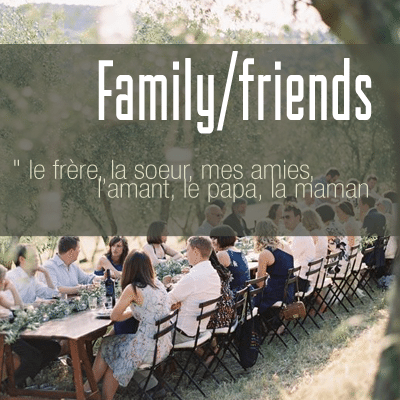When do you use “la” and “le” in describing family and friends in French? It may be confusing at first but it really is as simple as ABC. “La” is used when the subject is female and “le” is used when the subject is male.
The hip hop American slang “boo” was actually coined from the French word “beau”, which is an adjective placed in front of a male noun.
“Belle” on the other hand helps express the female noun.
Discover below on how to use this together with the usual French words relating to family, relatives and friends.

Get the vocabulary list in PDF format by clicking the button below.
Now let's discover words and phrases related to family and friends in French!
Family (la famille) vocabulary:
| la fille | daughter |
| le fils | son |
| le cousin, la cousine | cousin |
| le demi-frère | half-brother |
| la demi-soeur | half-sister |
| la famille | family |
| la femme | wife |
| le frère | brother |
| le gendre | son-in-law |
| le jumeau, la jumelle | twin brother, sister |
| la maman | mom |
| le mari | husband |
| la mère | mother |
| le neveu | nephew |
| la nièce | niece |
| l’oncle (m.) | uncle |
| le papa | dad |
| les parents | parents |
| le père | father |
| la soeur | sister |
| la tante | aunt |
| la bru | daughter-in-law |
| le beau-fils | son-in-law, stepson |
| la belle-fille | daughter-in-law, stepdaughter |
| le beau-frère | brother-in-law, stepbrother |
| la belle-sœur | sister-in-law, stepsister |
| le beau-père | father-in-law, stepfather |
| la belle-mère | mother-in-law, stepmother |
| la famille proche | close family |
| la famille éloignée | relatives |
The adjective beau (m.) or belle (f.) in front of the nouns fille, fi ls, frère, soeur, père, or mère helps express step or in-law.
- le beau-fils: son-in-law, stepson
- la belle-fille: daughter-in-law, stepdaughter
- le beau-frère: brother-in-law, stepbrother
- la belle-soeur: sister-in-law, stepsister
- le beau-père: father-in-law, stepfather
- la belle-mère: mother-in-law, stepmother
Compound phrases such as la belle-fille and le beau-fils have a double meaning. They are used to express daughter-in-law and son-in-law. In the following sentences, note that la bru also means daughter-in-law. Similarly le gendre means son-in-law as well.
- Ma belle-fille est la femme de mon fils. My daughter-in-law is my son’s wife.
- Ma bru est la femme de mon fils. My daughter-in-law is my son’s wife.
The adjective grand or grands placed before the nouns mère, père, or parents serves to express grandmother, grandfather, and grandparents.
- E.G: Ma grand-mère est grande. My grandmother is tall.
The adjective petite, petit, or petits placed before the nouns fille, fils, and enfants serves to express granddaughter, grandson, and grandchildren.
- E.G : Ma petite-fille s’appelle Laura. My granddaughter’s name is Laura.
The adverb arrière placed before grand-mère, grand-père, grands-parents, petite-fille, petit-fils, and petits-enfants serves to express great.
- J’ai des photos de mes arrière-grands parents. I have pictures of my great-grandparents.
- Mon arrière-grand-mère était pianiste. My great-grandmother was a pianist.
- Mon arrière-grand-père est né en 1890. My great-grandfather was born in 1890.
Download the family friends French vocab to confidently talk about your friends and family in French.
Friends (les amis) vocabulary
| l’ami(e) intime | close friend |
| les amoureux (m. pl.) | lovers (people in love) |
| l’amant(e) | lover |
| le/la camarade | buddy / friend, |
| le/la collègue | colleague |
| la connaissance | acquaintance |
There you have it, important vocabulary you need to know so you can engage in a conversation about your friends and family in French.
Please tell us in the comment section if there are some vocabulary topics that you would like to review.
P.S. You would be doing us a HUGE FAVOR by sharing it via Twitter or Facebook.

Speak, Listen, and Write French like a Native with Talk in French Complete Courses

[…] French Vocabulary: Family and Friends […]